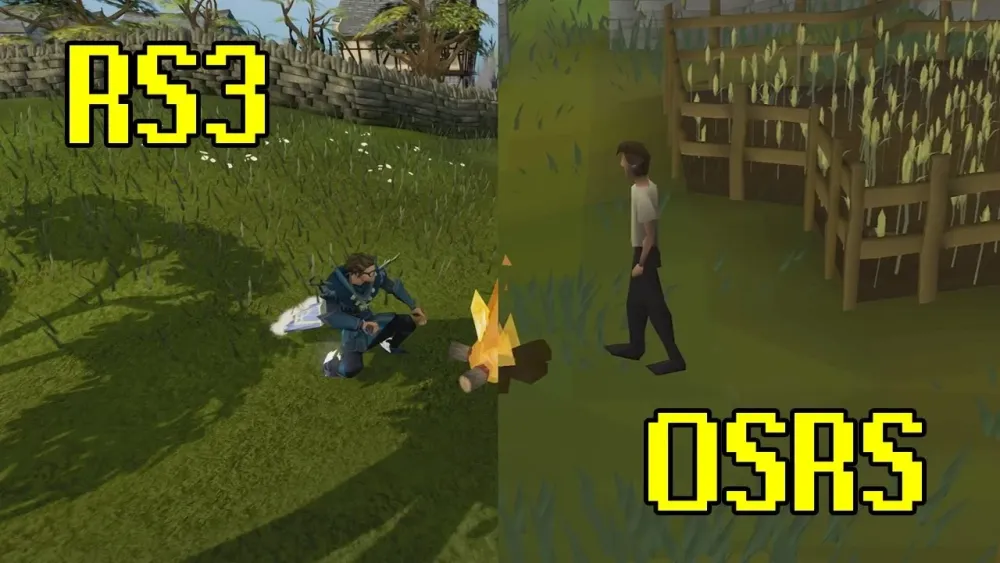Your cart is empty
Why Old School RuneScape Outshines RuneScape 3

Old School RuneScape (OSRS) and RuneScape 3 (RS3) are two versions of the iconic MMORPG that have sparked endless debates among players. While both games share the same roots, OSRS has captured the hearts of many with its nostalgic charm and community-driven approach. In this blog post, we’ll dive into why OSRS often takes the crown over RS3, exploring gameplay, community, progression, and more. Whether you’re a veteran player or new to Gielinor, here’s why OSRS might be the better choice for you.
OSRS thrives on its ability to transport players back to the early 2000s, delivering a raw, unpolished experience that feels authentic. Unlike RS3, which has embraced modernized mechanics, OSRS stays true to its 2007 roots, offering a grind-heavy adventure that rewards dedication.
Simpler Combat System
The combat in OSRS is straightforward, relying on the classic click-and-wait style. Players strategize with prayer switching, gear setups, and precise timing, especially in high-stakes PvP or boss fights like Zulrah. RS3’s Evolution of Combat (EOC), however, introduced ability bars and complex rotations, which many feel detracts from RuneScape’s original charm.
Retro Graphics Appeal
OSRS’s pixelated art style is a love letter to retro gaming. Its low-poly models and vibrant colors evoke memories of dial-up internet days. RS3, with its polished 3D visuals, can feel like it’s trying to compete with modern MMOs, sometimes losing the quirky aesthetic that made RuneScape unique.
Community-Driven Development
One of OSRS’s biggest strengths is its commitment to player input. Jagex polls major updates, ensuring the community shapes the game’s future. RS3, while still supported, often feels like it follows a top-down development path, with less transparency.
Polling System Keeps Players in Control
In OSRS, updates like new quests, skills, or areas (e.g., Fossil Island) require 75% community approval. This democratic approach prevents unwanted changes, fostering trust. RS3 players, conversely, have less say, with updates like microtransactions rolling out despite backlash.
Thriving Content Creator Scene
OSRS boasts a vibrant community of streamers and YouTubers like Settled and SoupRS, who showcase Ironman challenges, PvP, and skilling guides. RS3’s content creator pool is smaller, partly because its fast-paced progression leaves less room for unique playstyles to shine.
- OSRS streamers often highlight long-term goals, like maxing an account.
- RS3’s focus on endgame content can feel less relatable for casual players.
Slower, More Rewarding Progression
OSRS embraces the grind, making every level and achievement feel earned. RS3’s accelerated experience rates and microtransactions can make progression feel hollow for some players.
Skilling Feels Meaningful
In OSRS, reaching 99 in a skill like Woodcutting or Fishing takes months, if not years, for casual players. The grind builds pride, with milestones like the Skill Cape celebrated across clans. RS3’s faster XP rates, boosted by Treasure Hunter promotions, can diminish this sense of accomplishment.
Microtransactions in RS3 Break Immersion
RS3’s Treasure Hunter and Solomon’s Store offer XP lamps, cosmetics, and boosts, creating a pay-to-progress vibe. OSRS avoids this, with Bonds as the only real-world purchase, used for membership or in-game gold without directly impacting gameplay.
| Feature | OSRS | RS3 |
|---|---|---|
| XP Rates | Slower, grind-focused | Faster, with boosts |
| Microtransactions | Bonds only | Treasure Hunter, Store |
| Skill Cape Value | High prestige | Less impactful |
Endgame Content and Replayability
Both games offer robust endgame content, but OSRS’s approach feels more accessible and replayable, catering to diverse playstyles.
Raids and Bossing in OSRS
OSRS’s raids, like Chambers of Xeric and Theatre of Blood, are challenging yet approachable, with scalable difficulty. Solo players can tackle bosses like Vorkath, while groups dive into raids for rare drops like the Twisted Bow. RS3’s bosses, like Telos, often demand mastery of EOC mechanics, which can intimidate casual players.
Ironman Mode Shines in OSRS
OSRS’s Ironman mode, where players are self-sufficient, is a fan favorite. It forces creative problem-solving, like gathering resources for gear upgrades. RS3’s Ironman mode exists but feels less impactful due to faster progression and less emphasis on the grind.
- OSRS Ironman: Encourages long-term planning and resource management.
- RS3 Ironman: Faster unlocks reduce the mode’s challenge.
Economy and Player Interaction
The player-driven economy and social aspects of OSRS create a dynamic experience that RS3 struggles to match.
Grand Exchange in OSRS Feels Alive
OSRS’s Grand Exchange is a bustling hub where supply and demand dictate prices. Items like the Scythe of Vitur fluctuate based on raid activity, keeping the economy engaging. RS3’s economy, impacted by Treasure Hunter drops and faster resource gathering, can feel stagnant.
PvP and Clan Culture
OSRS’s Wilderness and PvP worlds foster a thriving clan scene, with events like Deadman Mode tournaments drawing crowds. RS3’s PvP is nearly nonexistent, with most players focusing on PvM. The social thrill of risking your gear in OSRS’s Wilderness has no real parallel in RS3.
In the end, choosing between OSRS and RS3 depends on what you value in an MMORPG. If you crave nostalgia, a tight-knit community, and a grind that feels rewarding, OSRS is hard to beat. Its retro vibe, player-driven updates, and slower pace create a world where every step matters. RS3 offers modern visuals and faster progression, but for many, it lacks the soul that makes OSRS special. Whether you’re slaying dragons in Varrock or skilling in Catherby, OSRS delivers a timeless adventure that keeps players coming back. Which game do you prefer, and why? Let us know in the comments!

